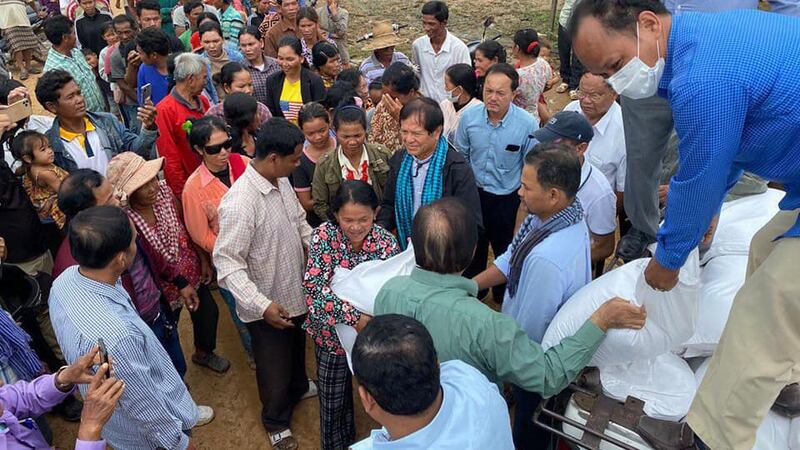Authorities in Cambodia’s swamped Banteay Meanchey province on Friday prevented opposition chief Kem Sokha from distributing much-needed food aid to flood victims, amid concerns over the lack of transparency surrounding millions of dollars in donations recently procured by the government.
Kem Sokha and other members from the banned Cambodia National Rescue Party (CNRP) were blocked by authorities as they sought to hand out rice, canned fish, instant noodles, and soy sauce to affected residents of Angkor Borei district, which has been hit particularly hard by the flooding triggered by tropical storms that has left 18 dead.
Senior CNRP member Meach Sovannara, who traveled to the area, told RFA’s Khmer Service that the food items were provided by donors and did not come from the party’s budget. He said local authorities should have allowed the distribution of aid and suggested that they blocked the group because they are biased in favor of Prime Minister Hun Sen’s ruling Cambodian People’s Party (CPP).
“The CPP is afraid [of us]—they made excuses, so we decided to cancel the event,” he said.
“Previously, the CPP accused the opposition of not helping, but when we did, they prevented us. This is a politically motivated case. It is wrong.”
Meach Sovannara urged the government to advise the authorities to stop political discrimination and allow aid distribution without prejudice.
Authorities arrested Kem Sokha in September 2017 and the Supreme Court banned his party for its role in an alleged plot to topple the government two months later. The ban, along with a wider crackdown on NGOs and the independent media, paved the way for Hun Sen’s CPP to win all 125 seats in parliament in the country’s July 2018 general election.
Kem Sokha was released from pre-trial detention to house arrest in September 2018 and granted bail in November last year by the Phnom Penh Municipal Court, the terms of which allowed him to travel within Cambodia but restricted him from taking part in any political activities.
Banteay Meanchey government provincial spokesman Ly Sary could not be reached by RFA for comment, but he told local a radio station that the authorities don’t discriminate against any particular political groups because villagers need assistance.
However, he confirmed that authorities did now allow Kem Sokha’s group to distribute aid because “there are other groups that also distributed in the area.”
Following Meach Sovannara’s appeal, Hun Sen issued a message via social media to his officials ordering local authorities to allow Kem Sokha and members of other political parties to distribute aid to the flood victims.
“I advise local authorities not to stop Kem Sokha and members of other political parties [who want to participate in the distribution of aid],” he wrote.
“Please cooperate with all political parties to help our people in this difficult time.”

Flood donations
Hun Sen’s message came after Kem Sokha donated U.S. $5,000 to the prime minister to help with flood relief and the two leaders exchanged kind words.
Kem Sokha posted a message on his Facebook page saying he had received donations from local and overseas donors, which he was turning over to flood victims. According to his post, he has also distributed aid in a few provinces.
“We are working together to help the people without any discrimination or political bias,” he wrote.
Hun Sen also wrote a letter thanking Kem Sokha for the donation.
Friday’s incident came a day after Hun Sen announced he had raised more than U.S. $6 million from “donors” to assist hundreds of thousands of families affected by flooding, prompting NGOs to question the origin of the aid and the opacity of a plan to distribute it. He pledged to assist all victims equally, regardless of their political affiliation.
Reports said that at least one of the donors is Try Pheap, a business tycoon with close ties to Hun Sen, while the deputy president of the National Committee for Disaster Management is Kun Kim, a former senior Royal Cambodian Armed Forces (RCAF). Both men were sanctioned by the U.S. Treasury Department in December for corruption.
NGOs said tycoons with questionable or criminal business practices regularly use the opportunity to donate their ill-gotten gains as a way to whitewash their past actions and to curry favor with the CPP.
Rising toll
The National Committee for Disaster Management spokesperson Khun Sokha told RFA Friday that the death toll from flooding rose by five to 18 from a day earlier, while 19 of Cambodia’s 25 provinces remained inundated—the hardest hit of which are Pursat, Battambang, Pailin, and Banteay Meanchey provinces, as well as Phnom Penh Municipality’s Dangkao district.
As of Friday, he said, some 200,000 people have been affected by the flood and at least 25,000 have been evacuated. Some 190,000 hectares (470,000 acres) of rice and other crops have been destroyed, in addition to an unspecified number of bridges and roads in rural areas, he said.
Authorities have warned of an increased risk of infectious diseases, such as malaria and dengue fever, as well as food poisoning and snake bites.
At least two more tropical storms are expected to hit Cambodia in coming days.
The mother of a two-month-old baby from Phnom Penh’s Dangkao district named Phorn Nary told RFA that she has been without shelter for four days and has yet to receive any aid.
“I don’t have rice or other food—no one has given me anything,” she said.
Khun Sokha said the National Committee for Disaster Management is providing aid to victims, but refused to disclose how much money had been spent on relief.
He said the committee has dispatched around 1,000 people to assist with rescue operations and that local authorities are working to transport food to victims.
“We are monitoring the situation,” he said. “We aren’t out of danger yet.”
Reported by RFA’s Khmer Service. Translated by Samean Yun. Written in English by Joshua Lipes.
